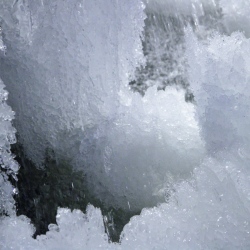
Common knowledge suggests that water is the most important molecule required for life to survive. But new research shows that proteins that usually contain it can function perfectly well without it—throwing into question the perceived wisdom that water is so vital.
A team of researchers from the Institute for Structural Biology in Grenoble, France, took myoglobin proteins—which carry oxygen to muscle and give flesh its red colour—and swapped out the water that usually coats their surface for a synthetic polymer. Doing so turns the proteins into a syrup-like fluid—and, it was expected, would dramatically change their function.
But to the researchers’ surprise, they work just the same as ever: they remain flexible, behave just the same on the inside, and can still bind oxygen as well as in living tissue. Myglobin, at least, couldn’t care less about H20. The results are published in the Journal of the American Chemical Society.
It’s a dramatic finding and, while it’s only a single scrap of evidence, goes some way to suggesting that water isn’t quite as important as we all think. Of course, the polymer used in the experiments doesn’t occur naturally, so protein-based lifeforms will still require water for now. But if our future ends up being more Dune than Waterworld, we may do just fine.
